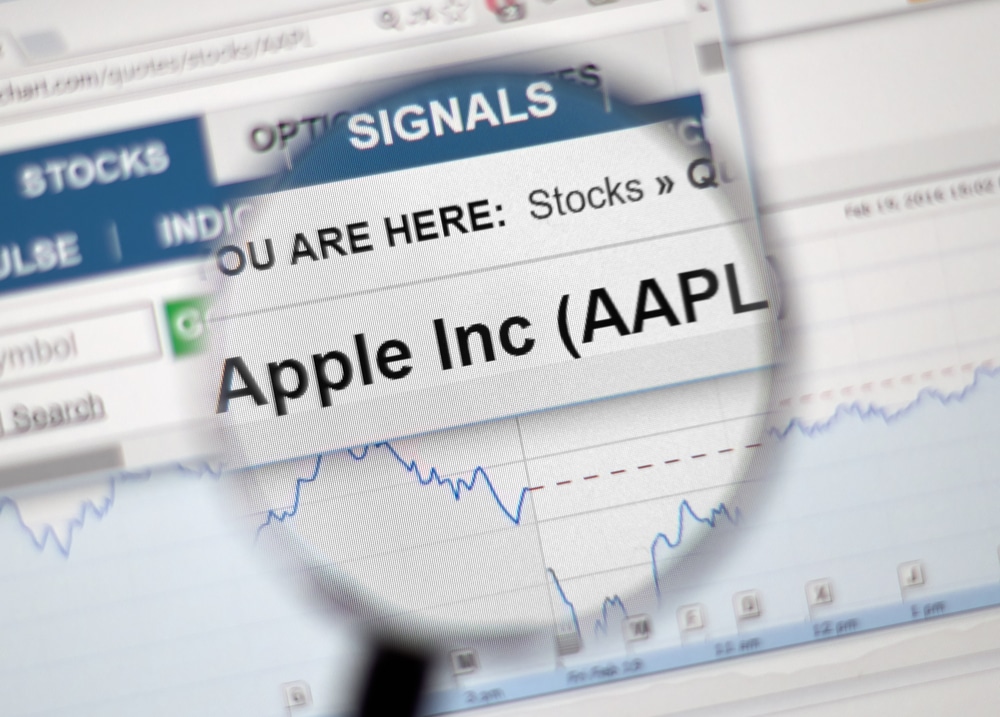Apple has been on an incredible bull run for the past five years and it’s understandable that many UK investors will want to buy shares in Apple.
If you want to take a bite out of Apple’s profits and invest in the company, you can buy shares in Apple from the UK with an FCA-regulated stock broker that provides access to US stocks. You can use our comparison of UK-based share dealing platforms that offer access to international markets and see what they charge for buying and selling US stocks, plus what the foreign exchange conversion costs are for converting GBP into USD.
🧑🎓Here are the steps to follow for buying Apple shares from the UK.
How to buy Apple shares in the UK:
- Open an account with a share dealing platform that lets you invest in US stocks
- Decide how much you want to buy and deposit fund your account
- As Apple is a US stock and traded in USD you need to convert your funds to USD. You can either do this before trading or the share dealing platform will do it automatically for you.
- In your share dealing platform type in Apple’s NASDAQ stock symbol (AAPL) and click “buy”. You can be given the option to buy at the currency price (market order) or set a maximin price at which you want to buy at (limit order).
How much does it cost to buy Apple shares (NASDAQ:AAPL)?
As of 16:00 17-Feb-2026 buying one Apple share costs $263.88. However, as well as the $263.88 cost of buying the shares you will also have to pay any relevant tax, commission when you buy and sell shares, custody fees for holding your shares on your account and foreign exchange fees for converting GBP into USD. You also have to consider the difference between the bid price (the price at which you sell shares) and the offer price (the price at which you buy shares). These fees vary depending on what sort of account you open, and with what broker.
Prices updated every 15 minutes.
🤔Note: Apple Stocks Versus Shares
In the US they refer to Apple shares as Apple stocks, but they are the same thing…
⚠️What to watch out for! USD Exchange Rates
When you buy Apple shares (or any US stock) a hidden cost is often the exchange rate a share dealing platform charge for converting GBP into USD. You can compare these in our US share dealing platform comparison table.
💡Hints: How to invest in Apple stock
Here are some of the best accounts for buying Apple shares:
- Interactive Brokers offers the cheapest FX rates for buying Apple shares
- Hargreaves Lansdown provides an excellent service if Apple is only going to be a small part of your portfolio.
- Dodl offers a very low account, dealing and FX cost for new and small investors.
- IG offers free US share dealing if you trade a certain amount each month.
Can you make money from buying Apple shares?
Yes, if you buy low and sell high! However, you can also lose money quickly. Look at Apple’s share price over the 12-month period: Massive upswings and deep consolidations. For investors that are biased towards the long side, watch to buy mostly on corrections.
You need to deal with probability too. Nobody gets it right every time. Sometimes you win, sometimes you lose. To win out in the long run, you have to cap your losses and max your gains.
Position-sized your trade in a way that even if prices move significantly against you the overall portfolio remains viable.
What are the major risks of trading Apple shares
The biggest risk of buying Apple shares in the short term is that you are on the *wrong side* of the trend. When you realise this, abandon the trade as soon as possible. Do not hope that the market will turn in your favour soon – because it may not. Many traders use stop losses strictly to prevent a losing trade from ballooning. You should do so too.
Another risk comes from Apple’s price pattern. In other words, when Apple’s shares are not ‘trending’ sufficiently up or down, it becomes harder to exploit price movements because there is insufficient distance between entry and exit points.
The last point relates to high volatility. For example, Apple’s share price spiked up after the Fed meeting on July 31 but slumped the very next day when Trump announced new tariffs on Chinese goods. These volatility will cancel trade signals quickly potentially resulting in minor losses.
If you plan to trade Apple shares in the short term, you will need to stay attune to Apple’s day-to-day behaviour. Remember, you do not trade markets. Rather, you trade your beliefs and understanding about the market.
Price breakouts are very important, especially when accompanied with gaps. A gap occurs when today’s trading range is completely outside yesterday’s trading range. New highs after some time are also important because it can create upward drifts.
Paper trade for a few months. Work out if the stock is suitable to your trading strategy. Not all do. So select your universe carefully.
Compare the costs of buying Apple shares with these stock brokers
| US Stock Platform | US Stock Commission | FX Rate | Account Fee | ISA | Customer Reviews | More Info |
|---|---|---|---|---|---|---|
 | £3.99 | 1.5% - 0.25% | £4.99 - £19.99 Monthly | ✔️ | (Based on 1,123 reviews)
| Visit Broker Capital at risk |
 | 0.5 Cents/Share | 0.02% | $0 | ✔️ | (Based on 1,330 reviews)
| Visit Broker Capital at risk |
 | 0.015 USD/Share | 0.25% | 0.12% - 0.08% | ✔️ | (Based on 74 reviews)
| Visit Broker Capital at risk |
 | £3.50 - £5 | 0.75% - 0.25% | 0.25% (£3.50 Monthly Cap) | ✔️ | (Based on 1,094 reviews)
| Visit Broker Capital at risk |
 | £5.95 - £11.95 | 1% - 0.25% | $0 | ✔️ | (Based on 1,763 reviews)
| Visit Broker Capital at risk |
 | £0 - £10 | 0.5% | $0 - $96 Yearly | ✔️ | (Based on 678 reviews)
| Visit Broker Capital at risk |

Jackson is a core part of the editorial team at GoodMoneyGuide.com.
With over 15 years of industry experience as a financial analyst, he brings a wealth of knowledge and expertise to our content and readers.
Previously, Jackson was the director of Stockcube Research as Head of Investors Intelligence. This pivotal role involved providing market timing advice and research to some of the world’s largest institutions and hedge funds.
Jackson brings a huge amount of expertise in areas as diverse as global macroeconomic investment strategy, statistical backtesting, asset allocation, and cross-asset research.
Jackson has a PhD in Finance from Durham University and has authored over 200 guides for GoodMoneyGuide.com.
To contact Jackson, please see his Invesdaq profile.




